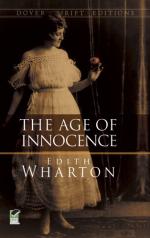Mrs. Archer, who had long been a widow, lived with her son and daughter in West Twenty-eighth Street. An upper floor was dedicated to Newland, and the two women squeezed themselves into narrower quarters below. In an unclouded harmony of tastes and interests they cultivated ferns in Wardian cases, made macrame lace and wool embroidery on linen, collected American revolutionary glazed ware, subscribed to “Good Words,” and read Ouida’s novels for the sake of the Italian atmosphere. (They preferred those about peasant life, because of the descriptions of scenery and the pleasanter sentiments, though in general they liked novels about people in society, whose motives and habits were more comprehensible, spoke severely of Dickens, who “had never drawn a gentleman,” and considered Thackeray less at home in the great world than Bulwer—who, however, was beginning to be thought old-fashioned.) Mrs. and Miss Archer were both great lovers of scenery. It was what they principally sought and admired on their occasional travels abroad; considering architecture and painting as subjects for men, and chiefly for learned persons who read Ruskin. Mrs. Archer had been born a Newland, and mother and daughter, who were as like as sisters, were both, as people said, “true Newlands”; tall, pale, and slightly round-shouldered, with long noses, sweet smiles and a kind of drooping distinction like that in certain faded Reynolds portraits. Their physical resemblance would have been complete if an elderly embonpoint had not stretched Mrs. Archer’s black brocade, while Miss Archer’s brown and purple poplins hung, as the years went on, more and more slackly on her virgin frame.
Mentally, the likeness between them, as Newland was aware, was less complete than their identical mannerisms often made it appear. The long habit of living together in mutually dependent intimacy had given them the same vocabulary, and the same habit of beginning their phrases “Mother thinks” or “Janey thinks,” according as one or the other wished to advance an opinion of her own; but in reality, while Mrs. Archer’s serene unimaginativeness rested easily in the accepted and familiar, Janey was subject to starts and aberrations of fancy welling up from springs of suppressed romance.
Mother and daughter adored each other and revered their son and brother; and Archer loved them with a tenderness made compunctious and uncritical by the sense of their exaggerated admiration, and by his secret satisfaction in it. After all, he thought it a good thing for a man to have his authority respected in his own house, even if his sense of humour sometimes made him question the force of his mandate.
On this occasion the young man was very sure that Mr. Jackson would rather have had him dine out; but he had his own reasons for not doing so.
Of course old Jackson wanted to talk about Ellen Olenska, and of course Mrs. Archer and Janey wanted to hear what he had to tell. All three would be slightly embarrassed by Newland’s presence, now that his prospective relation to the Mingott clan had been made known; and the young man waited with an amused curiosity to see how they would turn the difficulty.




